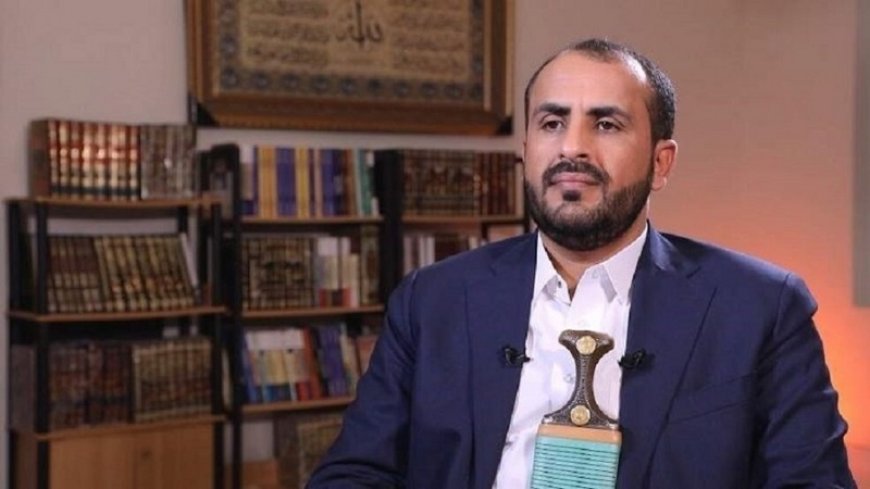Ansarullah of Yemen Vows Retaliation Against Israel Amid Escalating Tensions
The spokesman of Yemen's Ansarullah stressed that the country's army will attack inside the occupied lands.

The spokesman for Yemen's Ansarullah movement, also known as the Houthis, has issued a stern warning in response to what he described as military aggression by Israel. Mohammed Abdul Salam declared that Yemen's forces are prepared to launch attacks within Israeli territory, highlighting an escalation in the regional conflict.
In a recent statement, Abdul Salam condemned Israel's alleged attack on Hodeidah, a strategic port city on Yemen's western coast. "Israel's assault on Hodeidah marks the beginning of an open war," he stated. He described the attack as a desperate attempt by Israel to shift focus away from its recent setbacks. "This act of aggression is an attempt to expand the conflict and contravenes the established rules of engagement," Abdul Salam added.
Abdul Salam emphasized that any confrontation with the Yemeni people would not be straightforward. "The battle against the Zionist enemy will be without limits," he asserted. He reiterated that Ansarullah would not adhere to traditional laws of conflict in their response. "We are not afraid of an escalation; our cause is just, and we are prepared to face all consequences," he declared. "The nature of our response will be determined by the conditions of the battle, and there will be no red lines."
This statement comes amid heightened tensions in the region, with various parties voicing concerns over the potential for a broader conflict. The situation in Yemen has already been marked by years of civil war, which has drawn in regional powers and caused a severe humanitarian crisis.
Israel has not confirmed the attack on Hodeidah, but its involvement in the Yemeni conflict would mark a significant escalation. The Houthi movement, which has received support from Iran, has been a formidable force in Yemen, controlling large swaths of territory including the capital, Sana'a.
International observers are closely monitoring the situation, wary of the potential for increased violence. The United Nations has repeatedly called for a ceasefire and a return to negotiations to resolve the Yemeni conflict, but these calls have largely gone unheeded.
Abdul Salam's latest remarks underscore the volatility of the situation and the risk of further destabilization in the Middle East. As the conflict in Yemen continues, the possibility of it spilling over into broader regional hostilities remains a significant concern for global peace and security.
Additional Information:
The conflict in Yemen has created one of the world's worst humanitarian crises, with millions of people displaced and in need of urgent aid. The involvement of external powers such as Saudi Arabia, which leads a coalition fighting the Houthis, and Iran, which is accused of supporting the Houthis, has added layers of complexity to the war.
The potential for Israeli involvement introduces new dynamics to the conflict. Analysts suggest that Israel's actions may be motivated by concerns over Iranian influence in Yemen and the broader region. The Houthis have previously targeted Saudi Arabia and the United Arab Emirates with missile and drone attacks, raising fears of further regional destabilization.
As tensions escalate, the international community's role in mediating and potentially averting a wider conflict becomes increasingly crucial. The call for diplomatic intervention and humanitarian assistance grows louder as the specter of an expanded war looms over the Middle East.
Tags:
- UN
- Yemen
- US naval coalition
- USA
- ArabNews
- U.S. forces
- CENTCOM
- Jordan
- Drone Attack
- Sami Abu Zuhri
- Hamas
- Gaza Strip
- Fox News
- Alistair Boncal
- Kataib Seyed al-Shahada
- Iraqi Islamic resistance groups
- Donald Trump
- Joe Biden
- Tanf
- Iranian-backed militia groups
- Reuters
- Adam Smith
- US House Armed Services Committee
- United Nations
- Iran
- Zionist regime
- Gaza Strip massacres
- West Bank
- Palestine
- International community
- Human rights
- European countries
- United States
- UNICEF
- Palestine
- Israel
- Palestine
- Hamas
- Palestinian Islamic Jihad movement
- Al-Aqsa Mosque
- Gaza
- Al-Aqsa Storm
- European Union
- Asia
- USA
- EU













































